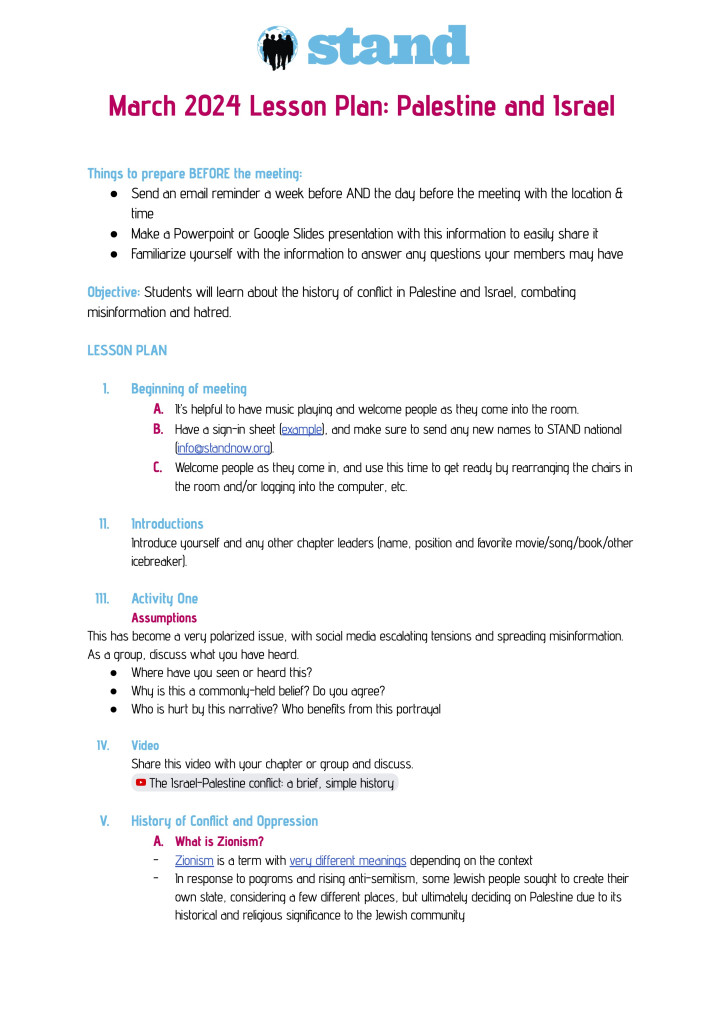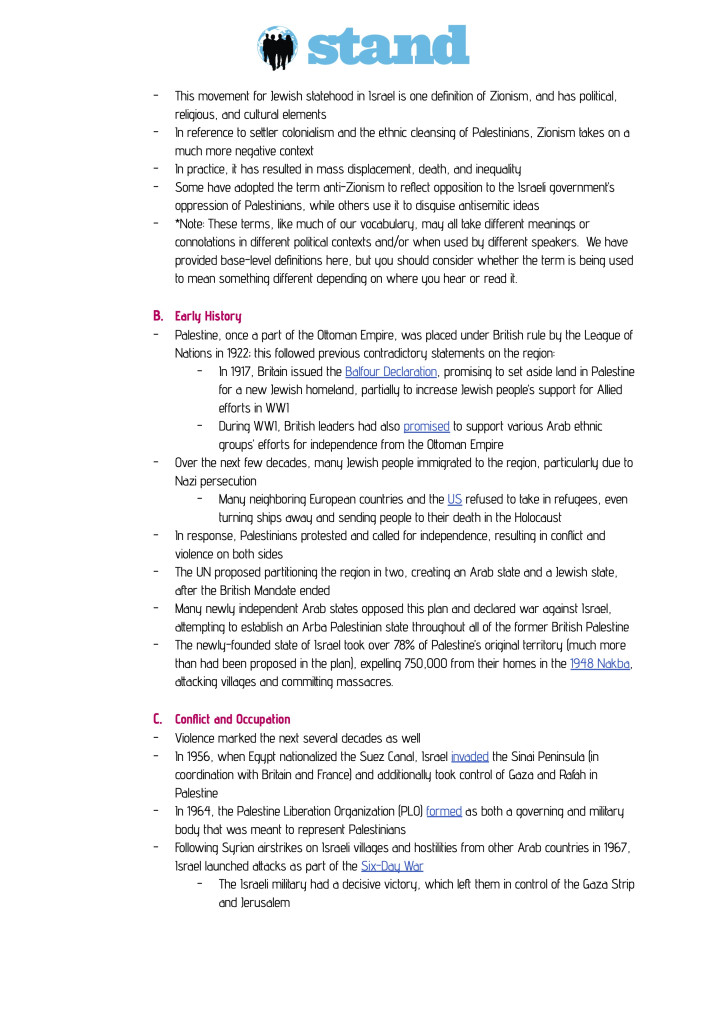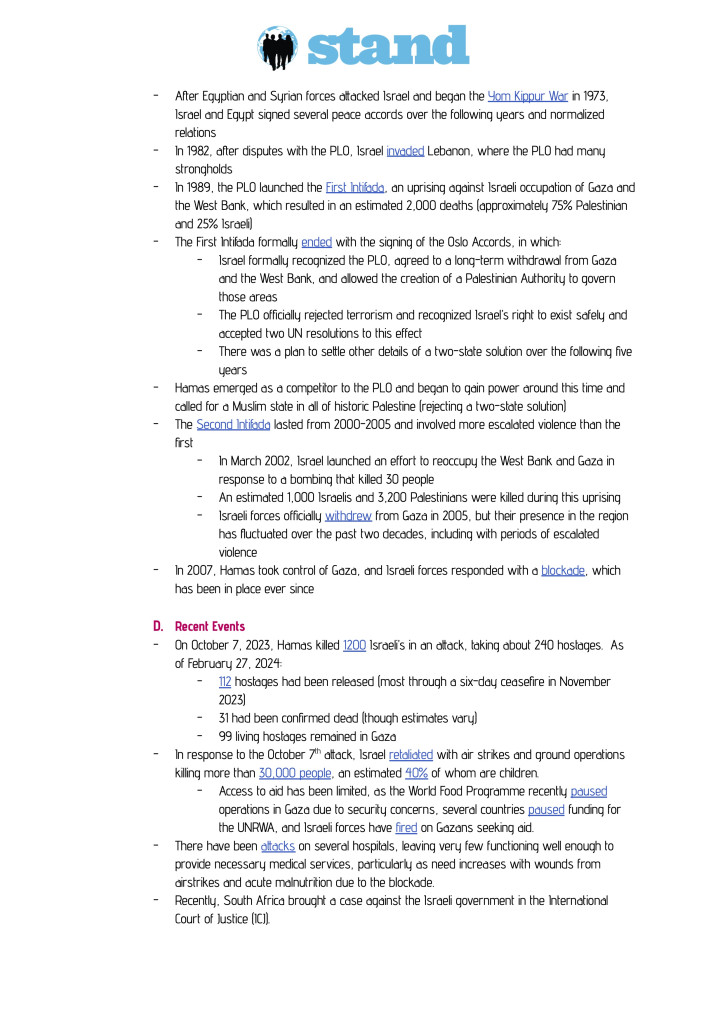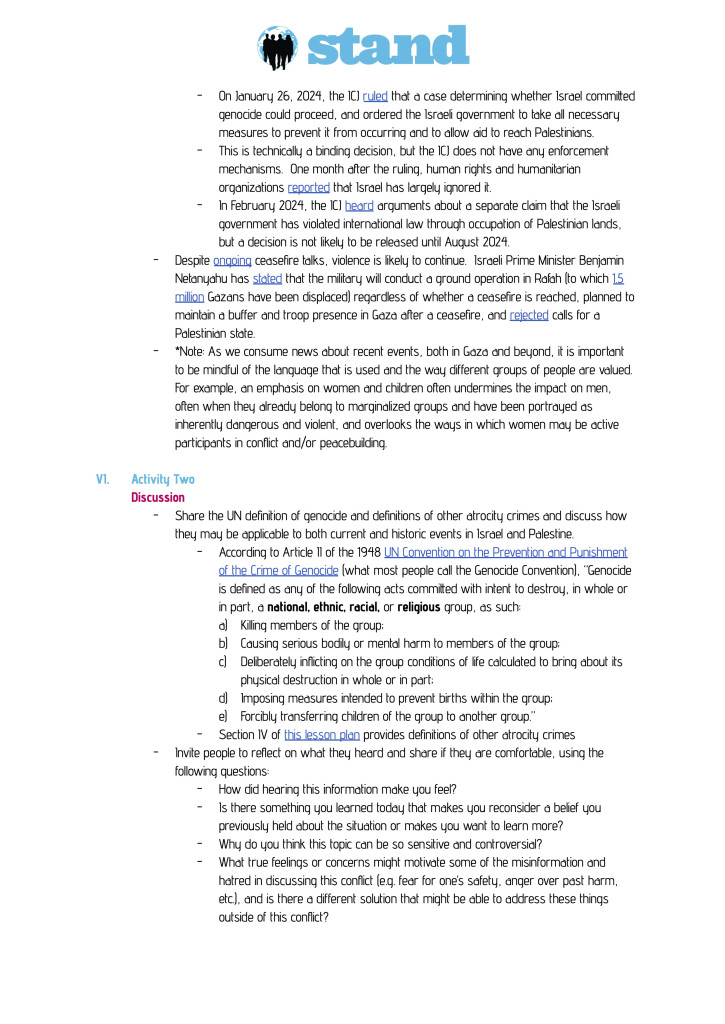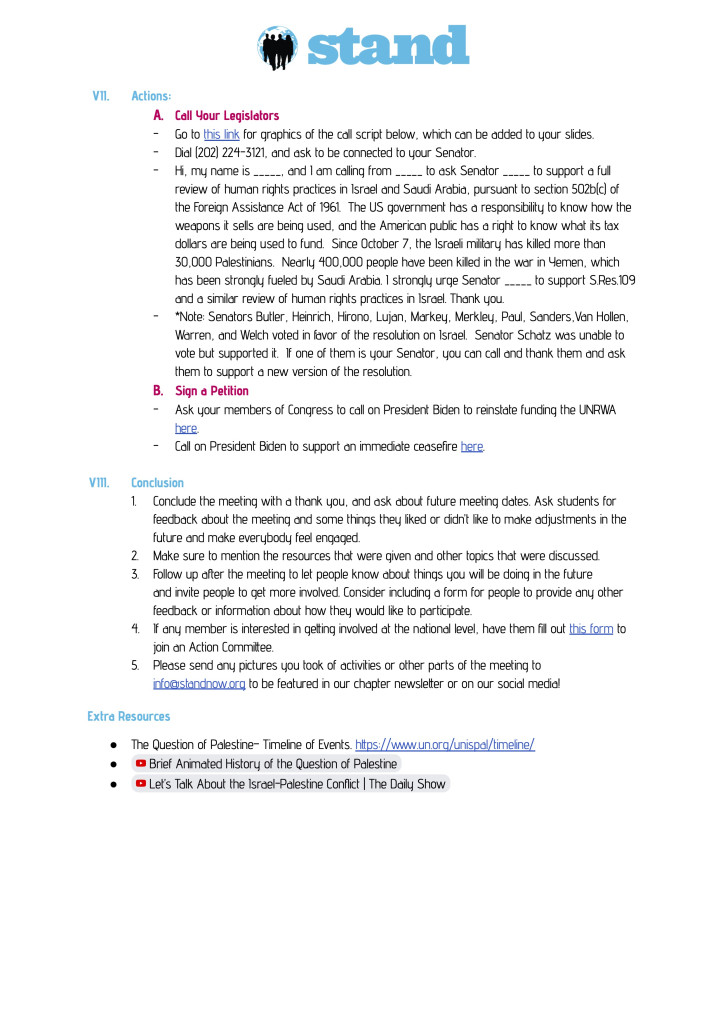Africa
Sudan
It has now been one year since the current war in Sudan between the Sudanese government and the Rapid Support Forces (RSF) rebel group began, a grim reality for many. Food insecurity is a prominent issue that has affected the region, an issue that humanitarian workers and agencies fear could become worse. The international community has paid little attention to Sudan even as mass starvation could lead to many deaths if not acted upon in the coming months. This has also been compounded by foreign support that has supplied both sides with weapons, which the UN says is an illegal circumvention of sanctions that it has placed to end the conflict. This is dangerous, as it will prolong the already escalating tensions. The United States has implored countries to halt all arms sales and to de-escalate the violence in the region. With fears of a new impending genocide, it is imperative for negotiations to take place and allow humanitarian aid be given to those who have suffered greatly, as they face impending chaos if change is not enacted.
Tigray, Ethiopia
Ethiopia continues to face a devastating drought and famine, causing millions to suffer. The legacy of conflict has had lasting impacts on people across the country, particularly in Tigray. While hostilities have ceased, it is clear that the problems are far from over. During a UN conference on humanitarian aid funding, Ethiopia, the US, and the UK collectively pledged $630 million in food aid to the region as well in an effort to alleviate famine. This is an important move, but UN funding in general is limited for humanitarian aid. Its $3.24 billion plan is only 5% funded, which severely limits the organization’s ability to get aid to people in need.
Despite the peace agreement reached in 2022, conflict over contested borders has resumed. Fighting recently broke out in the Raya Alamata district, between the Tigray and Amhara regions. Amharan officials have claimed that Tigrayan forces launched an invasion, an accusation denied by Tigray. In response, many have called for disarmament and further peace negotiations.
Cameroon
There has been no progress towards a lasting peace in Cameroon, but there have also been no major clashes between military forces and anglophone separatists or civilians reported in the past month. However, anticipating next year’s elections, opposition parties and civil society organizations have begun mass voter registration efforts, which may impact future decision-making and political engagement.
Outside of this conflict, International Crisis Group has warned of rising ethnic tensions in the Far North of Cameroon, as the Choa Arab people and Musgum people fight over scarce water and food resources. The conflict is not new, but its current iteration threatens broader ethnic violence, including among other ethnic groups in the region. Although the Cameroonian government has made attempts to quell the conflict, it has received little external attention, and more will need to be done to address the lack of access to basic resources.
Southwest Asia
Yemen
Yemen continues to become intertwined with larger geopolitical tensions and conflict. On Sunday, March 28th, a suspected attack by Yemen’s Houthi rebels involved an explosive detonation near a ship in the Gulf of Aden, near the coast of Aden, Yemen. The vessel’s crew witnessed the blast but reported no damage, and all crew members are safe. The Houthis have been launching drone and missile attacks in the same area, disrupting energy and cargo shipments through the Gulf of Aden. While the rebels did not immediately claim responsibility for this attack, the US military’s Central Command reported carrying out strikes targeting the Houthis, destroying five drone boats and one drone before takeoff from Houthi-controlled territory in Yemen. Despite the increasing tensions, there have been no reports of damage or injuries to ships in the vicinity. The Houthis have been targeting ships since November, with the stated aim of ending Israel’s offensive in the Gaza Strip against Hamas. However, the ships targeted by the Houthis have had little or no connection to Israel, the US, or other nations involved in the conflict. The recent attacks have raised the profile of the Houthis, who are members of Islam’s minority Shiite Zaydi sect. Moreover, reports suggest that the Houthis now possess a hypersonic missile, potentially increasing their threat and putting more pressure on Israel and its allies. Earlier in March, a Houthi missile struck a commercial ship in the Gulf of Aden, marking the first fatal attack by the Houthis on shipping.
The ongoing conflict exacerbates the already dire situation for the Yemeni people. Yemen, one of the poorest countries in the Middle East, heavily relies on imports for food, fuel, and other essential goods. Disruptions to shipping in the Gulf of Aden, on top of the 50 attacks on shipping conducted by the Houthis, further hinder the delivery of humanitarian aid and commercial goods, worsening the humanitarian crisis in the country. Moreover, the conflict contributes to instability, displacement, and loss of life, affecting the Yemeni population’s safety, well-being, and access to basic necessities. As the conflict escalates and attacks on shipping continue, the suffering of the Yemeni people is likely to deepen.
Syria
Syria remains caught between Iranian and Israeli hostilities after Iran declared it will retaliate after recent Israeli airstrikes on the Iranian Consulate in Damascus that killed at least 13 Syrians and Iranians. Iran has claimed Israel has killed Iranian generals and Syria, being close allies, has fully backed Iran in this conflict. Conflict between Israel and Syria has been long-standing, but this increase in aggression has sparked major backlash from the world. Iran’s foreign minister, Hossein Amirabdollahian has accused the United States of giving Israel the approval to attack Syria. The United States and Israel are preparing for retaliation from Iran, Syria, and Hezbollah allies of Lebanon. The UN has condemned the attack and Assistant-Secretary-General Khaled Khiari has stressed the need for “restraint” from all sides.
Outside of this conflict, recent fighting left 17 people dead in the southern province of Deraa. This clash between an armed group led by a former state security agent and a rival armed group led by a former member of ISIL (ISIS) follows an explosion that killed eight children the day before.
Sweden has also officially launched their war crimes trial against General Mohammed Hano for his alleged crimes and involvement during the 2012 Syrian War. This trial has received international attention, as many experts have considered this a massive step in holding the Syrian government and military accountable for their actions during the Syrian Civil War.
Palestine
Amidst ongoing airstrikes and bombs that recently killed 40 people in Gaza, contributing to the total Palestinian death toll of more than 34,000 people, ceasefire negotiations have resumed. Other estimates place this number at 42,000 after 200 days of conflict. Israeli and Hamas leaders met in Cairo to discuss a plan for a truce, and Israel has proposed an exchange of 33 Israeli hostages and an unknown number of imprisoned Palestinians, free movement between south and north Gaza, and a partial withdrawal of troops. 130 people are still being held hostage and at risk. A top Hamas official claims that they would disarm and agree to a truce of five or more years if Palestine could become an independent state along pre-1967 borders, but it is unlikely that Israeli officials and other international leaders will agree to this. Moreover, Prime Minister Benjamin Netanyahu has declared that Israel will invade the city of Rafah, where more than one million displaced Palestinians who fled violence in other parts of Gaza are now living, regardless of the outcome of these talks, with no plan to protect civilians. These tense negotiations are still ongoing, and no final decision has been reached as of April 30.
Throughout this, civilians continue to suffer. The UN asked for $2.8 billion to provide aid for food, sanitation, water, and healthcare, as massive operations are needed to restore destroyed hospitals, roads, water sources, and sanitation facilities, among other things. 70% of people are experiencing severe hunger in northern Gaza, and further escalation could create imminent famine. Also at the UN, Palestine’s bid for full membership was discussed, following a recent veto by the US over concerns about Hamas control over Gaza. The Permanent Observer of Palestine Riyad Mansour called for a ceasefire and a recognition of the right to self-determination and statehood, while the Israeli Ambassador denounced this as a Palestinian terror state. This discussion will be brought up again at the next General Assembly.
East and Southeast Asia
Burma
The American fossil fuel company, Chevron, has officially withdrawn from Burma and the Yadana gas project after 30 years of involvement. Throughout their campaign in Burma, they financially enabled the junta and their close allies, the Myanmar Gas and Oil Enterprise (MOGE). Despite their withdrawal, they will continue to support MOGE, which faced partial United States sanctions in October 2023. Posco International, a close ally of MOGE, has also funneled millions of dollars to the junta in order for their Shwe gas project to follow through. Both it and Daneli Group, an Italian steel manufacturer, have faced major backlash for supporting the junta with direct financial support and weapons manufacturing. In an effort to reach a resolution and address this, the UN has urged members to refrain from the export, sale, or transfer of jet fuel to the junta. Singapore has also cracked down on the sales of weapons to the junta after UN pressure.
Conflict continues in Burma as well. The Karen National Group has claimed to have captured one of the junta’s last outposts in Myawaddy. Over 200 junta troops have fled to the Thai border and in a visit near the border, Thai foreign minister Parnpree Bahidda-Nukara urged the junta not to retaliate and called for a de-escalation. The importance of this is clear after reports from UNICEF declaring that the number of landmine casualties has tripled in 2023, with 20% of those casualties to be children. Many Burmese people are fleeing to Thailand and Bangladesh to escape not only violence but also the recent revival of the conscription law. The junta has even abducted and forcibly recruited young Rohingya men to enlist, despite still being excluded from citizenship.
Additionally, ousted leaders Aung San Suu Kyi and Win Myint have been moved from prison to house arrest as a health measure in response to heat waves throughout Burma. Over 3,000 other political prisoners have also been released this month as part of a New Years amnesty deal.
East Turkistan (Xinjiang, China)
In the month of April, the genocide in East Turkistan continues, as well as the fight for awareness regarding the issue itself. On April 4th, an Argentinean online newspaper published an op-ed by World Uyghur Congress President, Dolkun Isa. Its publication of this op-ed holds major significance as it shows the difference made when other countries become involved in calling attention to the violation of human rights in East Turkistan. The op-ed underscores coercive tactics such as coercion-by-proxy and hostage diplomacy, while continuously highlighting the need for the international community to take action in addressing the situation. The World Uyghur Congress also published a joint letter ahead of German Chancellor Olaf Scholz’s visit to China, urging him to prioritize human rights and work to put an end to this crisis. Additionally, the European Parliament voted for a ban on products made with forced labor, requiring companies to investigate their international suppliers. However, critics worry that it does not do enough to prevent state perpetrated forced labor like in China. With the cooperation of international communities, a major difference can be made in bringing an end to the genocide in East Turkistan. However, there have still been some major challenges this month as well. A new ban on social media usage by Uyghurs restricts is a concerning act of censorship, accompanied by phone checks and further censorship. Chinese government officials use these social media platforms to deny the Uyghur genocide, and this latest ban stifles dissent.
North America
United States
April is Genocide Awareness Month, which commemorations four twentieth century genocides: the anniversary of the 1994 Genocide Against the Tutsi in Rwanda on April 7, the anniversary of the Cambodian Genocide on April 17, Armenian Genocide Remebrance Day on April 24, and occasionally based on the Hebrew calender, Yom HaShoah, or Holocaust Rememberance Day. On April 15, Representative Trent Kelly (R-MS-1) spoke at the Embassy of Rwanda for Kwibuka 30. He called for the United States to adopt the formal title of the 1994 Genocide Against the Tutsi in Rwanda instead of referring to it as the Rwandan Genocide, which is misleading. Senator Mike Rounds (R-SD) introduced S.Res.537 in January to urge the United States to make this distinction. Precise language is important to combat erasure and denial, and to honor the primary victims of genocide. Additionally, Representative Lori Trahan (D-MA-3) introduced H.Res.1156 to designate April 17 as Cambodian Genocide Remembrance Day.
Alongside this acknowledgement of past genocides, the ongoing genocide of Palestinians in Gaza has sparked over 80 student-led protest encampments on college campuses across the country. While some schools have agreed to reconsider investments in the Israeli military, numerous colleges have called the police on their own students to shut these protests down, resulting in the arrests of at least 2,000 students, faculty, and other protesters. Many people were subject to tear gas and other chemical irritants, stun guns, and violent force by riot gear-wearing police. At UCLA, police stood by for hours with no arrests as adult counter-protesters attacked students with fireworks and tear gas, coming back the very next day to shut the protest down and arrest at least 132 people.
Alongside this, there have been at least 1350 reported instances of antisemitism on many campuses, where swastikas have been drawn and Jewish students have been harassed. Some Jewish students are joining and leading these pro-Palestine protests and some are organizing pro-Israel counter-protests, while others fear the instigation of antisemitism and that they will be targeted for expressing their Jewish identity. Feelings are complex and nuanced on all sides. In response to this, the House of Representatives has passed a new bill expanding the definition of antisemitism to include speech targeting Israel. By redefining Title VI Civil Rights protections to include political criticisms, this bill could be used to further suppress dissent and could be considered a violation of First Amendment rights.
~
Alishba Waqar is a senior at Westfield High School. She contributed to the Yemen portion of this update.
Anika Gera is a junior at Terre Haute South Vigo High School. She contributed to the East Turkistan portion of this update.
Anne-Sophie Hellman is a senior at Buffalo State University studying History. She contributed to the United States portion of this update.
Grace Harris is a junior at UCLA studying International Development Studies. She contributed to the Tigray and Palestine portions of this update.
Jerry Harris is a graduate student at George Mason University in the Mass Atrocity and Genocide Prevention certificate program. He contributed to the Sudan portion of this update.
Mira Mehta is a junior at Brown University studying Economics and International & Public Affairs. She contributed to the Cameroon portion of this update.
Seng Hkawn Myitung is a junior at Albemarle High School. She contributed to the Burma and Syria portion of this update.

